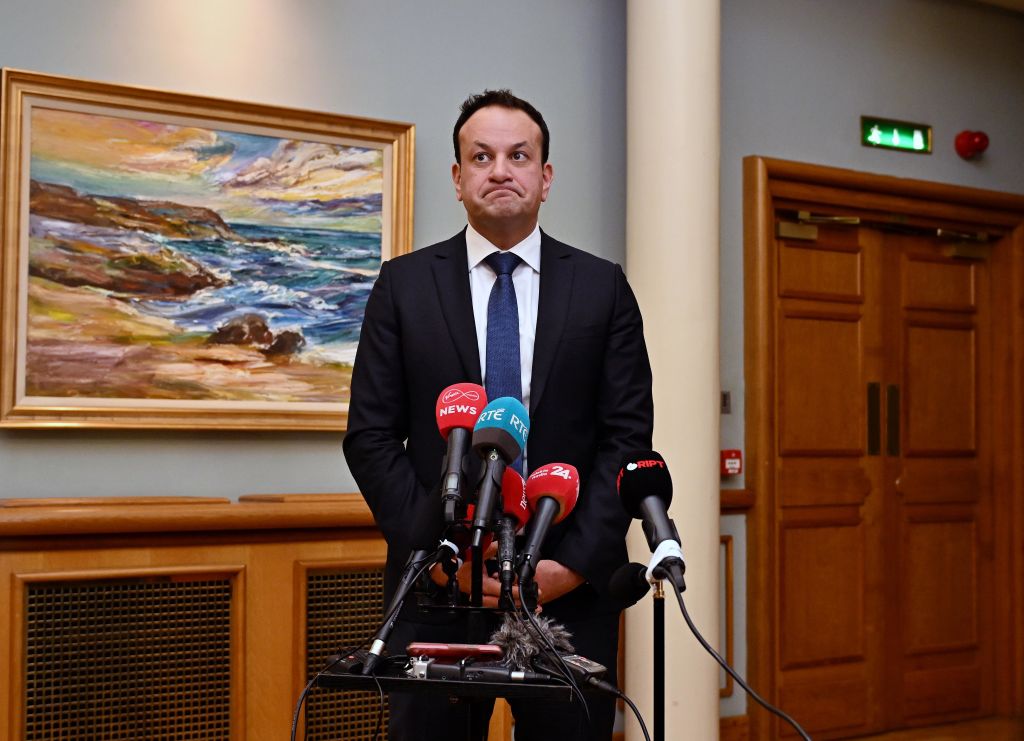Dublin
“Clearly, the government got it wrong,” is what the stoic, defeated Prime Minister Leo Varadkar said as Ireland’s family and care referendums were heavily defeated this weekend.
The rushed vote was held symbolically on International Women’s Day to, in Varadkar’s words, continue Ireland’s route along “the pathway of liberalism”. Yet voters delivered a sudden detour in a more conservative direction, despite appeals for a “yes” vote from nearly all the political parties, as well as heavily funded civil society groups.
Over two-thirds of the national public rejected a proposal to amend the Irish Constitution — Bunreacht na hÉireann — to eliminate the word “mother” and replace it with a vague reference to care, and over 70% voted against expanding the definition of family to include those based on marriage and “other durable relationships”.
The turnout of 44% was relatively high compared to previous referendums, while the majority of members of the two main parties Fine Gael (53%) and Fianna Fáil (76%) as well as the main opposition party Sinn Féin (78%), voted against the proposals.
Where some senior Irish politicians admitted defeat, though, many in the political and media class instead chose to make excuses, arguing that the public simply didn’t understand what they were being asked.
“We could have done more to make it clear,” Fine Gael Senator Regina Doherty told national broadcaster RTÉ shortly after the results. Sinn Féin leader Mary Lou McDonald said her party would “return to” the “sexist language” in the Constitution if elected to the next government. Tánaiste and Fianna Fáil leader Micheál Martin claimed that “the need for continued action to support families and to respect principles of equality was not challenged.”
Really, the public understood perfectly well what they were voting for, and issued a resounding “no” to the proposals on the grounds that the constitution, as it stands, is not sexist or discriminatory towards anyone. Ironically, it was the government which did not understand what it was proposing.
Throughout the campaign, government ministers could not confirm whether or not “durable relationships” would lead to polygamy being recognised as a family. One minister even implied a bigamous arrangement could constitute a “durable relationship”.
In echoes of the complacency that preceded the 2016 Brexit vote and the election of Donald Trump, the Irish establishment badly misjudged the coming result. Indeed, practically all Irish domestic polling indicated the proposals would pass.
The government hoped for a victory lap before the European and local elections later this year, apparently longing to bask in the glory of sweeping progressive momentum. Yet polling and public opinion was largely viewed through the prism of affluent, bien pensant south Dublin; when it came to the vote, Ireland’s forgotten counties delivered the hammer blow.
County Donegal rejected the family proposal by a whopping 80% and the care amendment by 83%. The sea of red (representing the “no” vote) compared to the tiny dot of blue for “yes” shows quite clearly the class and political divide in Ireland: south Dublin versus the rest of the country.
The scene in Dublin Castle following the result was relatively subdued, despite the overwhelming victory. Previous referendums on gay marriage in 2015 and abortion in 2018 passed comfortably and brought jubilant supporters to the Castle to celebrate, but this time Ireland’s police force had issued a Section 21 Order preventing anyone except tourists from entering the premises. A stage set up to celebrate the expected victory for the “yes” side was dismantled when it became clear the result was heading in the opposite direction.
The few politicians who had opposed the referendum were present at the site, including Senator Michael McDowell and Aountú leader Peadar Tóibín. Independent Senator Rónán Mullen, who also opposed the referendum, stated that “the people […] don’t like to have half-baked ideas pushed at them, they do actually know what they want.” He added, “They have voted resoundingly to keep a special reference to mothers […] that they shouldn’t be forced by economic necessity out of the home, and they have voted also to keep a link between marriage and the family.”
In the last decade, voters previously overwhelmingly approved cementing gay marriage into the constitution and legalising abortion. But with polarisation and culture wars seeping into the Irish body politic, it remains to be seen whether this latest referendum is an exception or part of a growing Irish disillusionment with liberalism.











Join the discussion
Join like minded readers that support our journalism by becoming a paid subscriber
To join the discussion in the comments, become a paid subscriber.
Join like minded readers that support our journalism, read unlimited articles and enjoy other subscriber-only benefits.
Subscribe